新概念第一册笔记裕兴版新概念第一册
- 格式:doc
- 大小:710.50 KB
- 文档页数:159
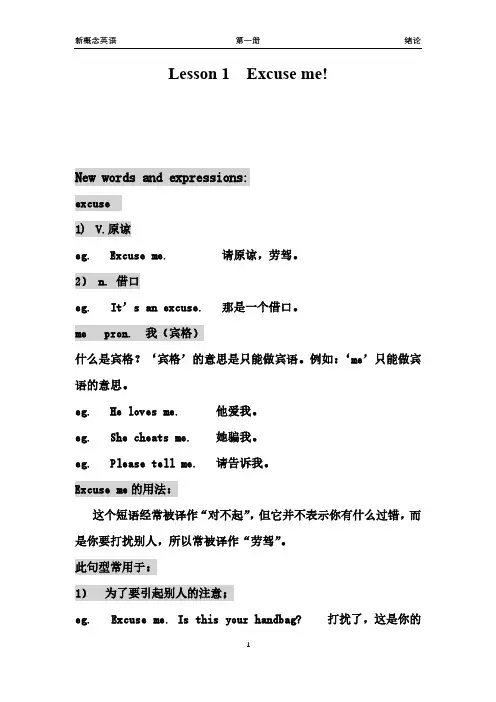
Lesson 1 Excuse me!New words and expressions:excuse1) V.原谅eg. Excuse me. 请原谅,劳驾。
2) n. 借口eg. It’s an excuse. 那是一个借口。
me pron. 我(宾格)什么是宾格?‘宾格’的意思是只能做宾语。
例如:‘me’只能做宾语的意思。
eg. He loves me. 他爱我。
eg. She cheats me. 她骗我。
eg. Please tell me. 请告诉我。
Excuse me的用法:这个短语经常被译作“对不起”,但它并不表示你有什么过错,而是你要打扰别人,所以常被译作“劳驾”。
此句型常用于:1)为了要引起别人的注意;eg. Excuse me. Is this your handbag? 打扰了,这是你的手提包吗?2)要打断某人或要打断别人的话eg. Excuse me. May I ask you a question? 打扰了,我能问你一个问题吗?3)向陌生人问路时eg. Excuse me. Could you please tell me the way to the railway station? 劳驾,请问去火车站的路怎么走啊?4)向某人借东西eg. Excuse me. Can I borrow your pen? 打扰一下,可以借你的钢笔用一下吗?5)需要从别人身边挤过或让别人给自己让路eg. Excuse me. Could you please make some room for me?劳驾,借过一下。
6)要求在宴席或会议途中离开一会儿Excuse me. May I leave for a little while? 对不起,失陪一下。
Sorry 用于你做错某事而向别人道歉的时候,表示“对不起”。
区别如下:1)请问几点了?eg. Excuse me. What time is it?2)不小心把水弄到别人身上。
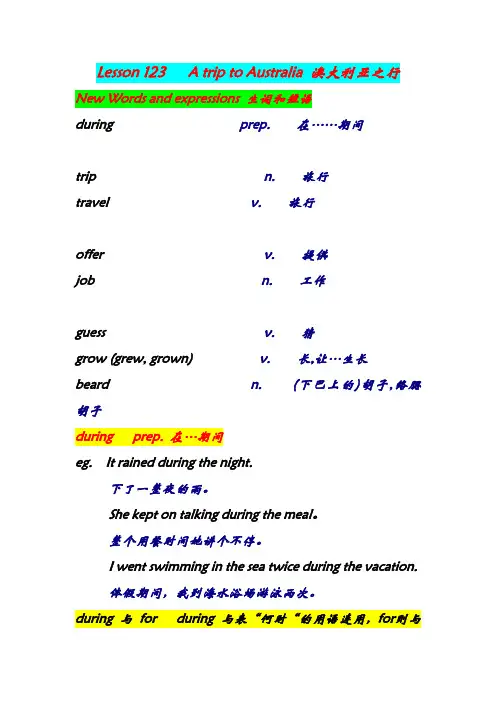
Lesson 123 A trip to Australia 澳大利亚之行New Words and expressions 生词和短语during prep. 在……期间trip n. 旅行travel v. 旅行offer v. 提供job n. 工作guess v. 猜grow (grew, grown) v. 长,让…生长beard n. (下巴上的)胡子,络腮胡子during prep. 在…期间eg. It rained during the night.下了一整夜的雨。
She kept on talking during the meal。
整个用餐时间她讲个不停。
I went swimming in the sea twice during the vacation.体假期间,我到海水浴场游泳两次。
during 与for during 与表“何时“的用语连用,for则与表”时间的长度“连用eg. I was in hospital during June.我在6月间一直住院。
I was in hospital for a month.我住院一个月。
during 与in 表示在某个时间所发生的事,during和in 二者均可用eg. We’re going on holiday during August. = We’re going on holiday in August.我们在8月要去度假。
trip n./ v.1) n. 旅行a bus trip 汽车旅行a business trip 出差go on a trip 出去旅行take a honey moon trip to Hawaii 到夏威夷蜜月旅行eg. My father will make a trip to New York next week.父亲下礼拜要到纽约去。
take a trip 观光旅行(美)make a trip 商务或办事的旅行(美)go on a trip=make a trip=take a trip 去旅行arrange a trip = organize a trip = plan a trip 计划旅行a fielf trip 实地考察a round trip 往返旅行make a side trip to (旅途中)顺路a sightseeing trip 观光旅行a trip to school 上学a trip to the office 上班a trip of the tongue 失言2)v. 绊倒trip over 被…绊倒eg. She tripped over the carpet and fell.她被地毯绊倒。
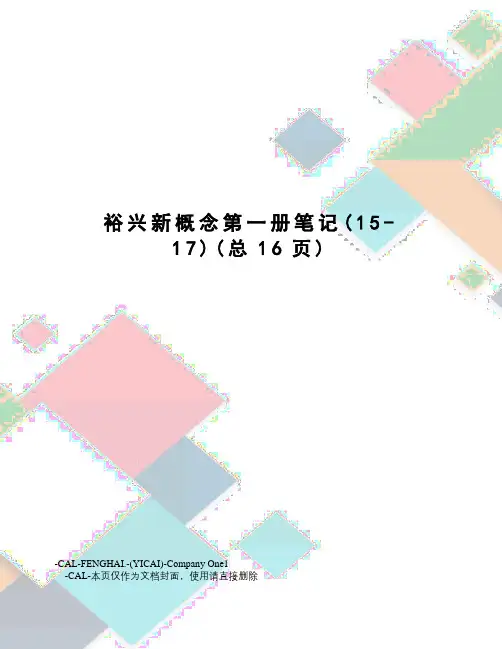
裕兴新概念第一册笔记(15-17)(总16页)-CAL-FENGHAI.-(YICAI)-Company One1-CAL-本页仅作为文档封面,使用请直接删除Lesson 15 Your passports, please. 你的护照. 请. 语音辅音根据发音部位或发音方法的不同分为:爆破音: [p] [b] [t] [d] [k] [g]摩擦音: [f] [v] [θ] [ ð ] [s] [z] [ʃ] [ʒ] [h] [r][f] [v]f oot v estli f e fi v ef ly v aluef ast v ase[θ] [ð]th ird th oughwor th th isbrea th th atclo th wor th yth ank th ese[s] [z]fa c e no s es ue z ooloo s e lo s es et z edpa ss va s eeg: Your nose is on your face.Sue is in the zoo.[θ] [S]th ank s ankth umb s umpa th pa ssmou th mou s eth ick s ick[ʃ] [ʒ]sh ip plea su refi sh mea su reeg. It's a pleasure to visit your ship.The fish is so big and let's measure it.[h] hill/head/hit/hat/horse/house [r] rest/rug/rat/read/roadNew Words and expressions 生词和短语customs n. 海关officer n. 官员girl n. 女孩,姑娘Danish adj.& n. 丹麦的&丹麦人Denmark n. 丹麦friend n. 朋友Norwegian adj. & n. 挪威的&挪威人Norway n. 挪威Passport n. 护照( pass通过,port港口,通过港口通过港口要出示护照)brown adj. 棕色的tourist n. 旅游者customs n. 海关customs duty 海关关税office n. 办公室in the office 在办公室里customs officer 海关官员girl n. 女孩eg. That girl is my daughter.Three girlsboy n. 男孩eg. The boy is her son.The two boys are her sons.Danish n. 丹麦人(国籍);丹麦语 adj. 丹麦的Denmark n. 丹麦(国名)eg. We are Danish.My friend is Danish.My friends are Danish.Is his friend Danish Yes, he is.Are their parents Danish No, they aren't friend n. 朋友eg. Are they your friendsThey are not your friends.friendly adj. 友好的be friendly to sb 对...友好eg. She is friendly to me. 她对我很好. Norwegian n. 挪威人(国籍) ;挪威语 adj. 挪威的Norway n. 挪威(国名)eg. I am from Norway.eg. I am Norwegian.passport n. 护照eg. Her passport is green; mine is brown.Their passports are red.brown adj. 棕色的brown hair 棕色头发tourist n. 旅行者eg. Is she a touristYes, she is.No, she isn'tAre they touristsYes, they areNo, they aren'tGrammar 语法 ---Plural form名词分为可数名词和不可数名词可数名词:officer 官员friend 朋友passport 护照case 箱子umbrella 雨伞不可数名词:water 水tea 茶air 空气coffee 咖啡powder 粉末可数名词分为单数形式和复数形式单数形式: 数量为一的事物a case an egg复数形式: 数量为一个以上的事物 a bus busesa friend friendsa case cases单数变复数的变化规则主要有以下几种:1. 在单数名词后面加"s"an officer officersa tourist touristsa passport passports2. 在以"s" "x" "sh" "ch" 结尾的单数名词变复数时,需在单词后面加"es"a bus busesa dress dressesa box boxesa fox foxesa fish fishesa wish wishesa watch watchesa match watches3. 以元音字母加"y" 结尾的单数名词变复数, 我们在词尾加sa boy boysa toy toysa key keys以辅音字母加"y" 结尾的单数名词变复数, 需把y去掉再加ies.a fly fliesa baby babiesa country countries4. 以o结尾的单数名词变复数时有两种形式,其一是直接在词尾加s; 另一种是在词尾加es.口诀: 黑人英雄爱吃土豆西红柿+esNegro Negroeshero heroespotato potatoestomato tomatoes其他则加 sphoto photosradio radioa man mena goose geesea foot feeta tooth teetha sheep sheep以f或fe结尾的单数名词变成复数,一般把f或fe变成v再加es.a wife wivesa knife knives名词复数的发音规则: 清清浊浊1. 如果名词词尾的发音是一个清辅音那么词尾加的s就发[s]的音.book booksmap mapsmouth mouths以清辅音t结尾的单词,变复数加s的时候,t 与s 共同发[ts].cat catsshirt shirtsskirt skirts2. 如果名词词尾的发音是一个浊辅音或者是词尾是一个元音,那么词尾加的s就发[z]的音.tie tiesdog dogspen pensdoctor doctors以浊辅音d结尾的单词,变复数加s的时候,d 与s 共同发[dz]. bed bedskid kidsfood foods3. 如果名词词尾的发音是:[s] /[z] /[ʃ]/ [ʒ]/[tʃ]/ [dʒ] 词尾加的s 或es 发[iz]dress dressesnose noseswatch watchesfish fishesTEXT 课文Your passports, please.Is there a problem with the Customs officer No, that's fine.海关官员有什么疑问吗不, 没有了.CUSTOMS OFFICER: Are you Swedish海关官员:你们是瑞典人吗GIRLS: No, we are not. We are Danish.姑娘们:不,我们不是瑞典人。
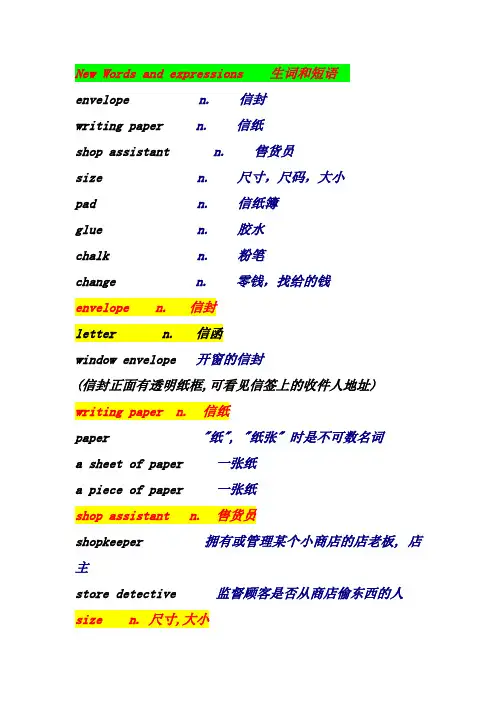
New Words and expressions 生词和短语envelope n. 信封writing paper n. 信纸shop assistant n. 售货员size n. 尺寸,尺码,大小pad n. 信纸簿glue n. 胶水chalk n. 粉笔change n. 零钱,找给的钱envelope n. 信封letter n. 信函window envelope 开窗的信封(信封正面有透明纸框,可看见信签上的收件人地址) writing paper n. 信纸paper "纸", "纸张" 时是不可数名词a sheet of paper 一张纸a piece of paper 一张纸shop assistant n. 售货员shopkeeper 拥有或管理某个小商店的店老板, 店主store detective 监督顾客是否从商店偷东西的人size n. 尺寸,大小1. 尺码,号 (衣服、鞋、帽等的)eg. What size does she want ?What size do you wear?This blouse is your size.这件衬衣是你的尺码.2. 大小(尺寸,体积,规模,身体等的), 多少(数量) eg. There are house of all sizes in that town.那个镇子有大大小小各式房子.pad n. 信签簿(指可一张张扯用的本子)glue n. 胶水(不可数名词)eg. I want some glue.---- Do you have any glue?---- No,I don'tchalk n. 粉笔coloured chalk 彩色粉笔change1. n. 找头; 零钱eg. Here is your change.这是你的找头.I have no change.我身上没有零钱.2. 变化;转换eg. There is a big change in his mind.他的思想有很大的变化.3. v. 改变eg. She never changes her mind.她从不改变主意.TEXT 课文Question: Does the lady buy any chalk?Listen to the tape then answer this question.听录音,然后回答问题。
![[英语学习]裕兴新概念第一册学习笔记](https://uimg.taocdn.com/f8926fd8bb68a98270fefa44.webp)
Lesson 117 Tommy's breakfast 汤米的早餐New Words and expressions 生词和短语dinning room(hall) 饭厅coin n. 硬币mouth n. 嘴swallow v. 吞下later adv. 后来toilet n. 厕所,盥洗室dinning room 饭厅,餐室(家中的)dinning 餐厅,餐厨用品dinning table 餐桌dinning car 餐车coin n. 硬币a silver coin 银币toss a coin 抛硬币(打赌正面和反面)eg. Could you change the one-dollar bill for coins?我用1美元纸钞和你换硬币好吗?Pay a person bake in his own coin.以其人之道还治其人之身.mouth n. 嘴eg. Open your mouth.张开你的嘴.-Don’t talk with your mouth full!-嘴里塞满食物时不要说话!Shut your mouth!(口语)闭嘴It sounds funny in your mouth.这种话由你的口中说出来,听起来就很可笑。
by word of mouth 口头上from hand to mouth 勉强糊口from mouth to mouth 口口相传have a big mouth 大嘴巴,嘴不严swallow1) v. 吞…, 咽…eg. He swallowed (up) the medicine with water.他把药和水一起吞下1) n. 一口(一口的量)take a swallow of beer 喝一口啤酒at one swallow 一饮而尽★ swallow v. 吞下① v. 吞下,咽下Tommy had swallowed the coins.汤米已经吞下了那硬币.②v. 抑制,使不流露I tried hard to swallow my doubts.我强忍着不露出怀疑的神色。
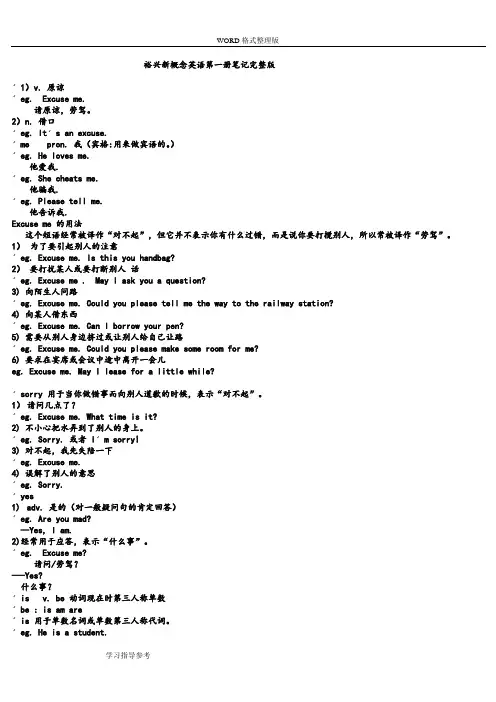
裕兴新概念英语第一册笔记完整版΄1)v. 原谅΄eg. Excuse me.请原谅,劳驾。
2)n. 借口΄eg. It΄s an excuse.΄me pron. 我(宾格:用来做宾语的。
)΄eg. He loves me.他爱我.΄eg. She cheats me.他骗我.΄eg. Please tell me.他告诉我.Excuse me 的用法这个短语经常被译作“对不起”,但它并不表示你有什么过错,而是说你要打搅别人,所以常被译作“劳驾”。
1)为了要引起别人的注意΄eg. Excuse me. Is this you handbag?2)要打扰某人或要打断别人话΄eg. Excuse me . May I ask you a question?3) 向陌生人问路΄eg. Excuse me. Could you please tell me the way to the railway station?4) 向某人借东西΄eg. Excuse me. Can I borrow your pen?5) 需要从别人身边挤过或让别人给自己让路΄eg. Excuse me. Could you please make some room for me?6) 要求在宴席或会议中途中离开一会儿eg. Excuse me. May I lease for a little while?΄sorry 用于当你做错事而向别人道歉的时候,表示“对不起”。
1)请问几点了?΄eg. Excuse me. What time is it?2) 不小心把水弄到了别人的身上。
΄eg. Sorry. 或者 I΄m sorry!3) 对不起,我先失陪一下΄eg. Excuse me.4) 误解了别人的意思΄eg. Sorry.΄yes1)adv. 是的(对一般疑问句的肯定回答)΄eg. Are you mad?--Yes, I am.2)经常用于应答,表示“什么事”。
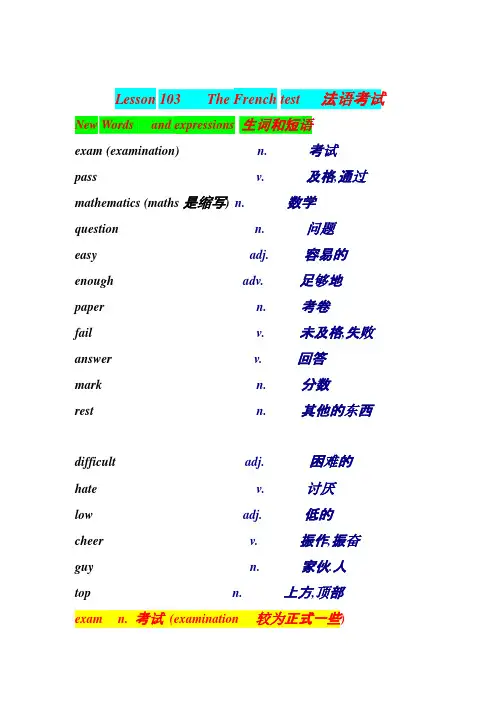
Lesson103The French test法语考试New Words and expressions生词和短语exam(examination)n.考试pass v.及格,通过mathematics(maths是缩写)n.数学question n.问题easy adj.容易的enough adv.足够地paper n.考卷fail v.未及格,失败answer v.回答mark n.分数rest n.其他的东西difficult adj.困难的hate v.讨厌low adj.低的cheer v.振作,振奋guy n.家伙.人top n.上方,顶部exam n.考试(examination较为正式一些)eg.He is a good student.He usually gots over80points in any exam.他是个好学生,他任何考试通常都在80分以上.an entrance exam/an entrance examination入学考试a midterm exam/a midterm examination期中考试a final exam/a final examination期末考试take an exam/take an examination参加考试pass an exam/pass an examination考试及格/通过考试fail an exam/fail an examination考试不及格exam/cheat in an examination考试作弊test(专项技能的)考试driving test驾照考试pass1)v.及格.通过eg.Only ten students passed the examination.只有十名学生通过了考试.pass in+具体学科pass in mathematics通过数学考试pass in Chinese通过语文考试2)通过,前进eg.The road is only wide enough for cars to pass.这条路宽度只够小汽车通过.3)穿过,越过eg.Every day I see him.He always passes me with a nod.每天我看到他,他都点个头和我擦肩而过.4)把....递给....(接双宾语)pass sb sth=pass sth to sbeg.Please pass him the paper./Please pass the paper to him.请把这张纸传给他.Will you pass the key?请把钥匙递给我好吗?5) ...消灭,结束e on!You'll be fine.The sorrow will pass.好了,你会没事的,悲伤会过去的. mathematics n.数字(maths是缩写)eg.She is poor at mathematics.她数学不太好.eg.Are you good at mathematics?你数学好吗?eg.I passed in mathmatics.我通过了数学考试.question1)n.问题(反义词为answer)question and answer/questions and answers问题和解答eg.May I ask you a question?我能问你个问题吗?I can't answer the last two questions.最后两个问题我回答不上来.beside the question远离本题的,离题的,不相关的beyond question毫无疑问eg.He is beyond question the best student in this class.他确实是这个班最好的学生.out of the question根本不可能eg.It is out of the question to make him help us.让他帮助我们是不可能的.3)v.询问,审问eg.I'll question him about what he was doing yesterday.我想问他昨天做了些什么.4)v.怀疑,对...提出异议eg.I question his honesty.我怀疑他是否诚实.easy adj.1)adj.简单的,容易的反义词为difficulteg.This is an easy question.这是个简单的问题.This is an easy job.这是件简单的工作.easy to do容易做...eg.The task is easy to do.这个工作容易做.It's easy for sb to do....对某人来说做某事很容易eg.It is easy for him to learn English.对他来说,学习英文很容易.eg.It is not easy for her grandfather to lift the box.对她的爷爷来说,把这个箱子抬起来真不容易.2)安逸的,舒适的,不用操心的lead an easy life过安逸的生活eg.Make yourself easy请放心.3)宽大的,温顺的,不严厉的be easy on sb/be easy with sb对...宽容,不严厉eg.Why are you so easy on her?你为什么那么宽容她?4)短语eg.I'm easy.随便,哪个都行.(口)Easy does it!别急!慢慢来!(口)Take it easy!放心好了,别着急,(口)enough1)adv.足够地eg.He runs fast enough to catch up with his friend.他跑得够快,能够赶上他的朋友.eg.Are you warm enough in such a light coat?你穿那么薄的衣服暖和吗?enough for sb to do足够做eg.This room is big enough for us to live in.这个房间我们住足够大了.You are not old enough to do it.你还太小,不能做这件事情.2)adj.充足的eg.Do you have enough time to do it?你有时间做这件事吗?Do you have enough chairs for everyone?你有足够的椅子给每个人吗?Ten pieces of paper are enough.十张纸足够了.enough + n. + (for sb) + to do足够(某人)做...的eg.Do you have enough money to lean me five dollars?你有没有足够的钱,借我5美元.There is enough food for us to last a week.食物足够我们维持一周的了.paper1)n.考卷(可数名词)eg.Fifty papers are not enough for the students to take the exam.五十份考卷不够学生考试.a mathemations paper一份数学试卷2)n.报纸(可数名词)相当于newspapera daily paper日报an evening paper晚报eg.That will certainly get into the papers.那一定会上报的.3)论文,报告(可数名词)4)文件,资料(常用复数形式papers)important papers重要的文件contract papers契约文件5)纸(不可数名词)a piece of paper/a sheet of paper一张纸three pieces of paper三张纸fail1)v.未及格(反义词pass)fail the exam考试不及格fail mathematics数学不及格2)v.失败(反义词succeed )eg.They failed.他们失败了.The plan failed.计划失败了.3) fail to do....未能做成某事eg.I failed to pass the exam.我没有通过考试.I failed to see him this afternoon.今天下午我未能见到他.Never fail to write to me.别忘记写信给我.answer1)v.回答eg.He doesn't want to answer me.他不想回答我.2) v.应答,回应eg.Please answer the phone.answer the door应门answer the letter回信3)n.答案eg.Do you know the answer to this question?你知道这道题的答案吗?mark1)n.分数(可数名词)school marks学校的成绩get a high mark in English英语得到高分get 80 marks in mathematics数学得了80分2)n.记号,印,标记rest1) n.其他的东西eg.You can eat up the rest of the bread.你可以把剩下的面包吃光.You open the door and window.I'll do the rest.你打开门和窗户,剩下的由我来做.eg.The rest of the money was put on the shelf.剩下的钱放在了架子上.The rest of the students went back home.剩下的学生回家了.2)n.休息take a rest/have a rest休息一下difficult1)adj.困难的(反义词easy)difficult to do....做...是困难的eg.The question is difficult to answer.该问题很难回答.It's difficult for sb to do...对某人来说做某事很难eg.It is difficult for her to type a letter.打一封信对她来说很困难.2)难对付的eg.He is a difficult man to get along with.他是一个很难相处的人.hate v.讨厌eg.I hate dogs.我讨厌狗.eg.They hate each other.他们互相厌恶.hate doing....不喜欢做...eg.She hates cooking.她不喜欢做饭.They hate typing these letters.他们讨厌打这些信.hate to do...不愿意...,不想做...eg.I hate to say it,but you are mistaken.我很不想说这句话,但你的确错了. low adj.1)低的a low wall矮墙a low roof低屋顶eg.Be careful!It's a low door.小心,门很矮.a low price低价格a low temperature低温at a low speed以低速度运行2)(身体)弱的,没有精神的,意志消沉的eg.He is in a low state of health.他的健康状态不好.eg.He is low with a cold.他因感冒而没精神.I feel so low today.我今天心情很坏.3)(声音)低的in a low voice小声地low season淡季high season旺季cheer v.1)振作,振奋eg.The news cheered the family.那个消息使那家人振奋不已.cheer up!打起精神.2)欢呼,喝彩,声援(某人),为(某人)加油,打气eg.The crowd cheered when he appeared.当他出现时群众发出欢呼声.guy n.家伙,人复数为guyseg.He's a nice guy.他是个好人.top n.上方,顶部反义词是bottomat the top of a mountain在山顶the top of the page书页的上方from top to toe从头到脚,完全地on top of the world非常幸福的,欢天喜地的. TEXT课文Question:How long did the exam last?Listen to the tape then answer this question.听录音,然后回答问题。
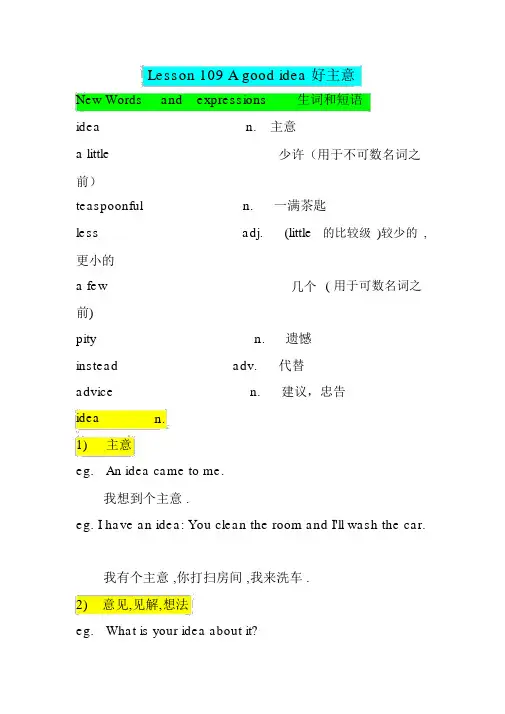
Lesson 109 A good idea 好主意New Words ideaa little and expressions生词和短语n.主意少许(用于不可数名词之前)teaspoonful less n.一满茶匙adj.(little的比较级)较少的,更小的a few几个( 用于可数名词之前)pity instead advicen.遗憾adv.代替n.建议,忠告idea n.1)主意eg.An idea came to me.我想到个主意 .eg. I have an idea: You clean the room and I'll wash the car.我有个主意 ,你打扫房间 ,我来洗车 .2)意见,见解,想法eg.What is your idea about it?关于这件事你的意见任何 ?eg. I don't like the idea that money is everything.我不喜欢金钱就是一切的想法 .a little少许(置于不可数名词之前)eg.Will you eat a little cake?你要不要吃点蛋糕 ?little 几乎没有 ,很少的(置于不可数名词之前 )eg.I have little time for reading.我几乎没有时间读书 .There is little hope of his recovery.他复原的希望极为渺茫 .a little 与 littlea little表示"少",但是还有一点,即重点放在"有".而little 则表示 "有.但是极少 ",即重点强调 "几乎没有 "eg. There's a little wine left in the bottle.瓶子里还剩下一点酒 .( 原来以为是空的 ,但发现还 "有",是较为乐观的看法 )There's little wine left in the bottle.瓶子里还剩下多少酒 .( 原来以为是更多 ,但发现"剩下很少",是悲观的看法)only a little只有一点点quite a little相当多的 ,颇多的teaspoonful n.一茶匙的量匙teaspoon n.茶handful n.一把a handful of sand一把沙子mouthful n.满嘴a mouthful of food满嘴饭eg. D on't talk with a mouthful of food.嘴里塞满了饭时 ,不要讲话 .less1)adj. 较少的,更小的 (little 的比较级 )eg. I will have less work to do tomorrow.我明天的工作就更少了 .2)作不定代词eg.I know little about it , but he knows even less.对此我了解甚少 ,而他知道的更少 .3)adv. 更不(与more 相对)eg.This story is less interesting.这个故事更没意思 .After the exam, he works less hard.考试以后 ,他学习更不努力了 .a few几个(通常置于可数名词之前)in a few days过两三天few 和 a fewfew 是"几乎没有 "的否定性意见 . a few 是"有一些"的肯定性意见 . 视说话者的想法而定 ,不一定根据数的大小 ,因而到底指何种程度的数量要看文章的前后关系而定 .not a few不少的,相当多的eg. Not a few people have made that mistake.不少人犯过这种错误 .only a few仅少数,只有几个....eg. Only a few men were in the room.房间中只有几个男性 .quite a few(口语中)相当多的eg.You will have to wait quite a few weeks.你必须等上好几个礼拜 .pity n.1)遗憾eg.It's a pity that he failed again.真遗憾他再次失败了 .What a pity!真可惜! 实在可怜 !What a pity(that) she cannot come!他不能来真是遗憾 .2)怜悯,同情eg.He felt pity for the jobless man.他可怜那无业男子 .(fell pity)instead adv.代替eg.I don't like beer , give me coke instead.我不喜欢喝啤酒 ,给我可乐好了 .instead of代替...,而不eg.I will go to see her instead of you.要去看的是她而不是你 .eg.I have to finish my work instead of going out.我必须完成工作 ,不能外出 .advice n.建议,忠告eg.I asked my teacher for advice on my English.我请老师对我的英语学习给些建议.Let me give you a piece of advice.让我给你个忠告 .give him a piece of advice offer him a piece of advice 给他忠告给他的忠告或建议take his advice refuse one's advice 听他的忠告不听某人的劝告some advice on... /some advice about ....有关...的忠告advise v. 忠告,劝告,建议eg.The doctor advised taking a week's rest.那医生建议我休息几周.advise sb to do sth忠告(某人)做....advise that ....eg.I advised him to stop smoking.= I advised that he (should) stop smoking.我劝他戒烟 .TEXT课文Question: What does Jane have with her coffee?喝咖啡时 Jane 吃了什么 ?Listen to the tape then answer this question.听录音,然后回答问题。
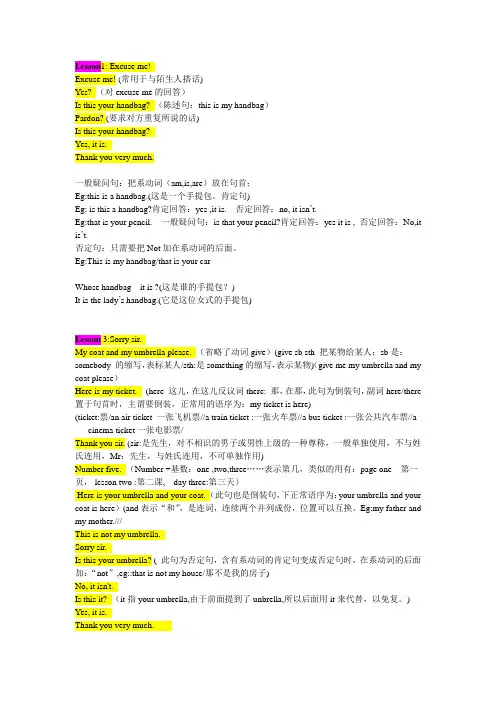
Lesson1: Excuse me!Excuse me! (常用于与陌生人搭话)Yes? (对excuse me的回答)Is this your handbag? (陈述句:this is my handbag)Pardon? (要求对方重复所说的话)Is this your handbag?Yes, it is.Thank you very much.一般疑问句:把系动词(am,is,are)放在句首;Eg:this is a handbag.(这是一个手提包。
肯定句)Eg: is this a handbag?肯定回答:yes ,it is. 否定回答:no, it isn‟t.Eg:that is your pencil. 一般疑问句:is that your pencil?肯定回答:yes it is , 否定回答:No,it is‟t.否定句:只需要把Not加在系动词的后面。
Eg:This is my handbag/that is your carWhose handbag it is ?(这是谁的手提包?)It is the lady‟s handbag.(它是这位女式的手提包)Lesson 3:Sorry sir.My coat and my umbrella please. (省略了动词give)(give sb sth 把某物给某人:sb是:somebody 的缩写,表标某人/sth:是something的缩写,表示某物)(give me my umbrella and my coat please)Here is my ticket. (here 这儿,在这儿反议词there: 那,在那,此句为倒装句,副词here/there 置于句首时,主谓要倒装,正常用的语序为:my ticket is here)(ticket:票/an air ticket 一张飞机票//a train ticket :一张火车票//a bus ticket :一张公共汽车票//a cinema ticket一张电影票/Thank you sir. (sir:是先生,对不相识的男子或男性上级的一种尊称,一般单独使用,不与姓氏连用,Mr:先生,与姓氏连用,不可单独作用)Number five. (Number +基数:one ,two,three……表示第几,类似的用有:page one 第一页, lesson two :第二课, day three:第三天)Here is your umbrella and your coat. (此句也是倒装句,下正常语序为:your umbrella and your coat is here)(and表示“和”,是连词,连续两个并列成份,位置可以互换。
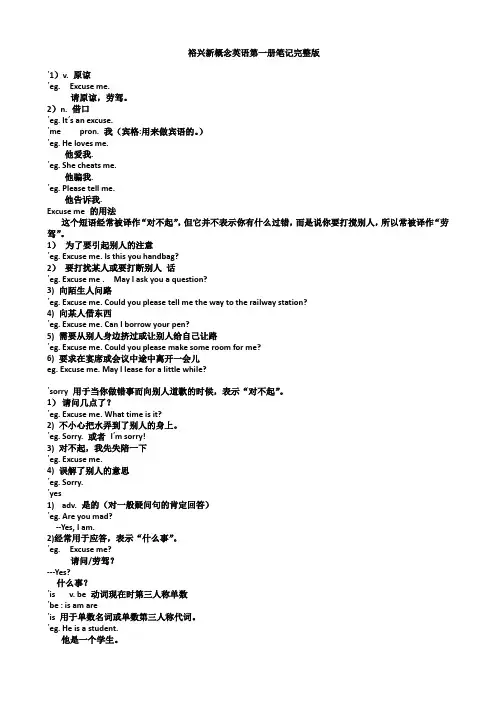
裕兴新概念英语第一册笔记完整版΄1)v. 原谅΄eg. Excuse me.请原谅,劳驾。
2)n. 借口΄eg. It΄s an excuse.΄me pron. 我(宾格:用来做宾语的。
)΄eg. He loves me.他爱我.΄eg. She cheats me.他骗我.΄eg. Please tell me.他告诉我.Excuse me 的用法这个短语经常被译作“对不起”,但它并不表示你有什么过错,而是说你要打搅别人,所以常被译作“劳驾”。
1)为了要引起别人的注意΄eg. Excuse me. Is this you handbag?2)要打扰某人或要打断别人话΄eg. Excuse me . May I ask you a question?3) 向陌生人问路΄eg. Excuse me. Could you please tell me the way to the railway station?4) 向某人借东西΄eg. Excuse me. Can I borrow your pen?5) 需要从别人身边挤过或让别人给自己让路΄eg. Excuse me. Could you please make some room for me?6) 要求在宴席或会议中途中离开一会儿eg. Excuse me. May I lease for a little while?΄sorry 用于当你做错事而向别人道歉的时候,表示“对不起”。
1)请问几点了?΄eg. Excuse me. What time is it?2) 不小心把水弄到了别人的身上。
΄eg. Sorry. 或者I΄m sorry!3) 对不起,我先失陪一下΄eg. Excuse me.4) 误解了别人的意思΄eg. Sorry.΄yes1)adv. 是的(对一般疑问句的肯定回答)΄eg. Are you mad?--Yes, I am.2)经常用于应答,表示“什么事”。
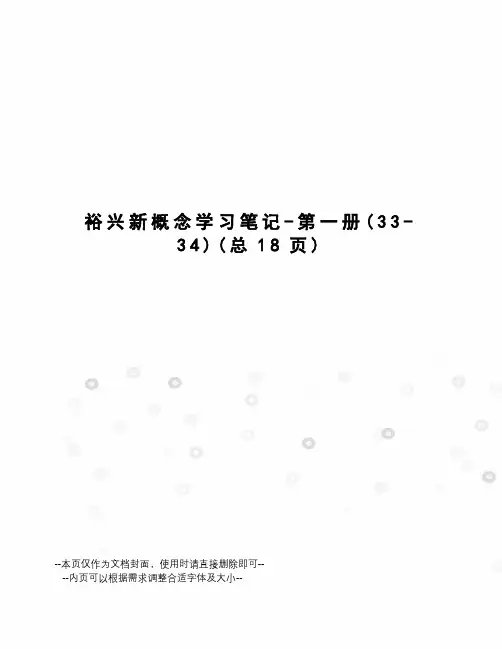
裕兴新概念学习笔记-第一册(33-34)(总18页)--本页仅作为文档封面,使用时请直接删除即可----内页可以根据需求调整合适字体及大小--Lesson 33 A fine day 晴天语音连读在语流中连读是常见的现象,一般是在有意义连系的词之间,可以是辅音与元音之间的连读,也可以是元音与元音之间的连读.eg. Please co me in.I must finis h i t in an hour and a half.O ne of us must goHe re is a pai r of shoes在句子中间有停顿的地方不能连读. 例如, 在下面一句中it 与you 不能连读.eg. If you need it, you may keep it.New Words and expressions 生词和短语day n. 日子cloud n. 云sky n. 天空sun n. 太阳shine v. 照耀with prep. 和……在一起family n. 家庭(成员)walk v. 走路, 步行over prep. 跨越,在…之上、在….的正上方。
bridge n. 桥boat n. 船、小船(ship 大的轮船)river n. 河aeroplane n. 飞机ship n. 轮船shine v. 照耀sunshine n. 阳光fly v. 飞day n. 日子eg. It's a fine day. 好天气day after day 一天一天的/日复一日的 day and night 日日夜夜day-break 拂晓daydream v. 做白日梦eg. You are always daydreaming.你总是做白日梦.day after day 日复一日Sunday[] 星期天Monday 星期一Tuesday 星期二Wednesday 星期三Thursday 星期四Friday 星期五Saturday 星期六It's a fine day today.今日天气晴朗moon 月亮cloud n. 云(可数名词)eg. There are some clouds in the sky.天空中有一些云彩.black cloud 乌云eg. When there are black clouds, you can tell it's going to rain.当乌云密布的时候,天就快下雨了.cloudy: adj. 多云的 full of cloudsWhat's the weather like todayIt's cloudy.cloudless adj. 无云的,晴朗的 without clouds n. 万里无云(可数名词) sky n. 天空in the sky 在空中eg. There is a bit of blue sky between clouds.在云彩之间可以看到一点蓝天.sky blue 天蓝色sky-high adj. 非常高 very higheg. Prices have gone sky-high.价格已经高的不得了.sky light n. 天窗sun n. 太阳son n. 儿子sunrise n. 日出sunset n. 日落eg. a beautiful sunrise 美丽的日出a beautiful sunset 美丽的日落sunglasses n. 太阳镜a pair of sunglasses 一副太阳镜eg. There are two pairs of sunglasses in her handbag.有两幅太阳镜在她的手提包里.Take off your sunglasses, please./ Take your sunglasses off, please.= Take them off, please.请脱掉你的太阳镜.sun n. 太阳sunny 晴朗的,充满阳光的( cloudless )a sunny room 充满阳光的房间a sunny day 晴天shine v. 照耀eg. The sun shines every day.太阳每天照耀着大地.The sun is shining.太阳正照耀着大地.sunshine 阳光,阳光的照耀sunlight 阳光eg. You're my sunshine after the rain.你是我雨后的阳光.with prep. 和...在一起be with .... 和... 在一起eg. I'm with my parents.我和我的父母在一起.She is with her family.她和他的家人在一起.They are with their children.他们在和他们的孩子在一起.family n. 家庭 (成员)----- How many people are there in your familyThere are four people in my family.family man 家庭观念很强的人/已有家的男人family doctor 家庭医生home 抽象概念eg. My home is in China.我家在中国.house 指房子结构eg. Will you come to my house tomorrow walk home 走回家go out for a walk 散步eg. Let's go out for a walk.让我们出去散散步呢.over prep. 跨越, 在...之上on 在....之上(接触物体表面) beneath 在...之下eg. A book is on my desk.一本书在我的书桌上.eg. There is a village beneath the hills.山脚下有一个村庄.above 在 ... 上方below 在 ... 下方eg. The book is above me on the shelf.书在我上方的书架上.Put the desk below the picture.把书桌放在这幅画的下面.over 在 ... 垂直的上面under 在 ... 垂直的下面eg. The bridge is over the river.桥在河的上面.The pair of shoes is under the chair.那双鞋在椅子下面.over adv. 跨越go therego over thereeg. He is going there. 他打算去那. He is going over there.go to Francego over to Franceeg. They will go over to France.他们将去法国.come to my housecome over to my houseeg. My friend is coming over to my house.我的朋友就要到我家来了.bridge n. 桥eg. There is a bridge over the river.江上有一座桥.walk on the bridge 在桥上走walk over the bridge 走过桥boat n. 船 (用木浆划水的船)boat race 赛船in the same boat 同在一条船上( 指同在一个不好的形势下)eg. If you lose your job, I'll lose mine, We are in the same boat.你丢了工作,我也会丢了我的工作,我们在同一条船上. river n. 江,河eg. There are some boats on the river.有几只小船在江面上.There are many fishes in the river.在河里面有许多种鱼.ship n . 轮船spaceship 宇宙飞船aeroplane n. 飞机(正式)plane 飞机(口语)fly1. v. 飞;飞行eg. An aeroplane is flying over the river. 一架飞机正在飞越这条江.fly a kite 放风筝.I must fly. 我必须马上走了./我必须赶紧离开.eg. I am late , I must fly. 我晚了, 我必须抓紧时间.I am flying to London tomorrow. 我明天要飞到伦敦去.2. n. 苍蝇not hurt a fly. 非常善良,非常温顺 (连一只苍蝇都不肯伤害)TEXT 课文Questions:1. Is it a fine day or not天气好不好2. Who is Mr. Jones with琼斯先生和谁呆在一起It is a fine day today.Where is the Jones family On the bridge.琼斯一家人在哪里在桥上It is a fine day today. 今天天气不错。
他人整理,与本人无关。
只是我下载要分。
故分享之。
Lesson 1 Excuse meexcuse v. 原谅me pron. 我(宾格)yes adv. 是的is v. be动词现在时第三人称单数this pron. 这your possessive adjective 你的,你们的handbag n.(女用)手提包pardon int. 原谅,请再说一遍it pron. 它thank you 感谢你(们)very much 非常地★Excuse me.1、引起对方注意时2、常用于与陌生人搭话,打断别人的说话或从别人身边挤过,或在某个聚会中突然中途要离开一会儿时Excuse us for a moment. 对不起,让我们单独聊会。
sorry 对不起,用于对别人有伤害时★me pron. 我(宾格)人称代词:宾格:在动词、介词之后形容词性的物主代词:不能单独使用名词性物主代词:只能单独使用★is v. be动词现在时第三人称单数be动词:am、is、areI amshe/ he/ it isyou/ we/ they are★pardon int. 原谅,请再说一遍Pardon?/ I beg your pardon. 请求对方把刚才讲过的话重复一遍。
[语法]含有be动词的陈述句、否定句和一般疑问句含有be动词的任何句子,否定句就是在be动词后面加not;如果变一般疑问句,就把be动词提前到句子的前面。
[课文]Excuse me.Yes?Is this your handbag?Pardon?Is this your handbag?Yes, it is.Thank you very much.Lesson 2 Is this your…?[词汇](10)pen n.钢笔pencil n.铅笔book n.书watch n.手表coat n.上衣,外衣dress n.连衣裙skirt n.裙子shirt n.衬衣car n.小汽车house n.房子★dress①n. 连衣裙;套裙②n. 服装,衣服casual dress 便服evening dress 晚礼服★house n.房子house 房子,一般指独立的院落,更具体的指房子的建筑,结构family 侧重家庭的成员There are four people in my family. 在我家里有四口人。
New Words and expressions 生词和短语envelope n. 信封writing paper n. 信纸shop assistant n. 售货员size n. 尺寸,尺码,大小pad n. 信纸簿glue n. 胶水chalk n. 粉笔change n. 零钱,找给的钱envelope n. 信封letter n. 信函window envelope 开窗的信封(信封正面有透明纸框,可看见信签上的收件人地址) writing paper n. 信纸paper "纸", "纸张" 时是不可数名词a sheet of paper 一张纸a piece of paper 一张纸shop assistant n. 售货员shopkeeper 拥有或管理某个小商店的店老板, 店主store detective 监督顾客是否从商店偷东西的人size n. 尺寸,大小1. 尺码,号 (衣服、鞋、帽等的)eg. What size does she want ?What size do you wear?This blouse is your size.这件衬衣是你的尺码.2. 大小(尺寸,体积,规模,身体等的), 多少(数量) eg. There are house of all sizes in that town.那个镇子有大大小小各式房子.pad n. 信签簿(指可一张张扯用的本子)glue n. 胶水(不可数名词)eg. I want some glue.---- Do you have any glue?---- No,I don'tchalk n. 粉笔coloured chalk 彩色粉笔change1. n. 找头; 零钱eg. Here is your change.这是你的找头.I have no change.我身上没有零钱.2. 变化;转换eg. There is a big change in his mind.他的思想有很大的变化.3. v. 改变eg. She never changes her mind.她从不改变主意.TEXT 课文Question: Does the lady buy any chalk?Listen to the tape then answer this question.听录音,然后回答问题。
裕兴新概念学习笔记第一册Lesson 37 Making a bookcase做书架语音:-----口语练习We see a man and his wife at the breakfast table. They have been married for a long time. They are not speaking to each other.They haven't spoken to each other at the breakfast table for years. The husband is reading his newspaper. We can't see his face. Today , she is using a new kind of coffee for the first time. The husband picks up his cup. He isn't very interested.New Words and expressions 生词和短语work v. 工作hard adv. 努力地make v. 做bookcase n. 书橱,书架hammern. 锤子paint v. 上漆,涂pink n.& adj. 粉红色favourite adj. 最喜欢的work v. 工作work hard 努力工作hard work 艰苦的工作hard-working 勤奋的eg. He is a hard-working employee.他是个勤奋的雇员.We must work hard.我们必须努力工作.That's hard work.那是艰苦的工作.Job如何有报酬的工作(可数名词)eg. He has a good job in the bank.他在银行里有一份很好的工作.hardadv. 努力地work hard 工作能力take it hard 承受很深的打击eg. His mother died, and he is taking it hard.她的妈妈死了,他正承受着悲痛.adj. 坚硬的, 困难的,努力的eg. The ice is as hard as rook.这块冰硬得像一块岩石.hard-working 努力的,勤奋的hard work 艰苦的工作hard- hearted 心肠硬的make v. 做make ----- makingmake the tea沏茶make the coffee煮咖啡make the bed 铺床make a meal 做饭eg. His mother is making a meal.他的妈妈正在做饭.Their parents are making the meal.他们的父母正在做饭.make it : succeed 成功了eg. I can make it.我能成功.make up 化妆eg. She is making up her face now .她正在化妆.You've got no time to make up.你没有时间化妆了.make-up n. 化妆品eg. Too much make-up looks unnatural.太多太浓的化妆看着不自然.make n. 牌子eg. What make is your car你的车是什么牌子的bookcase n. 书橱, 书架bookshelf n. 书架bookworm n. 书虫,书籍bookshop n. 书店bookstore n. 书店bookmark n. 书签a closed book to sb 对某人来说…..是一点也不懂eg. Politics is a closed book to me.政治对我来说一点也不懂.hammer n. 锤子paint v.1. 漆; 涂 ...2. 画paint + the bookcase + pink谓语+ 宾语 + 宾语补足语pink 宾语补足语结构: 动词+代词/名词+形容词paint + the town +red 谓语宾语宾语补足语paint the town red狂欢,胡闹paint v.paint the wall white把墙刷成白色eg. Who is painting a picture谁在画面paint n. 油漆,涂料, 颜料Wet paint ! 油漆未干painter n. 粉刷工, 画家painting n. 画(油画, 水彩画)drawing n. 画(用铅笔或钢笔线条画,多指素描) picture n. 泛指各种画,照片pictures n. (复) 电影pink n./adj. 粉色, 粉红色的pink collar 粉领which collar 白领blue collar 蓝领in the pink of health 身体很好favouriteadj. 最喜欢的eg. This is my favourite CD.这是我最喜欢的CD.---- Am I your favourite studentYes , you are .No, you're not.n. 最喜欢的东西eg. These books are my favourites.These are my favourite books.This type of chocolate is my favourite.This is my favourite type of chocolate.Grammas ----- be going to do用法:1. 表示打算要做某事.eg. My sister is going to visit her teacher tomorrow.我的姐姐打算去拜访她的老师.I am going to put the bookcase beside the desk.我打算把书橱放在书桌旁边.2. 表示按计划,安排要发生的事.eg. The meeting is going to begin at nine.会议将在九点开始.3. 表示某件事即将发生.eg. It's going to rain!天要下雨了.She's going to faint!她要晕倒了!The books are going to fall.书要掉下来了.结构: be going to do1. to 后面一定要加动词原形.2. be 按人称和数的变化而采取不同的形式. make a bookcaseeg. I am going to make a bookcase .我打算做一个书橱.cook a mealeg. She is going to cook a meal .她要做一顿饭.They are going to swim in the river.他们要去江里游泳.疑问句: 把系动词提前----- Are you going to paint the bookcase pink 你打算把书橱刷成粉色的吗Yes, I am.No, I am not.----- Is he going to clean the car你要洗车吗Yes, he is.No, he isn't否定句: 系动词后面加 noteg. They are not going to work there.他们不打算到那去工作.She isn't going to give her new pen to him.她不打算把她的新笔给他.特殊疑问句eg. What are you /we/they going to do你(们)/我们/他们要做什么What is he/she going to do他/她打算做什么What is your mother going to do你的妈妈打算要做什么What colour are you going to paint the bookcase你打算把书橱涂上什么颜色What size are you going to buy你打算买多大尺码的TEXT 课文Making a bookcaseQuestions:1. What colour is George going to paint the bookcase That's hard work.那是艰苦的工作.Job如何有报酬的工作(可数名词)eg. He has a good job in the bank.他在银行里有一份很好的工作.hardadv. 努力地work hard 工作能力take it hard 承受很深的打击eg. His mother died, and he is taking it hard.她的妈妈死了,他正承受着悲痛.adj. 坚硬的, 困难的,努力的eg. The ice is as hard as rook.这块冰硬得像一块岩石.hard-working 努力的,勤奋的hard work 艰苦的工作hard- hearted 心肠硬的make v. 做make ----- makingmake the tea沏茶make the coffee煮咖啡make the bed 铺床make a meal 做饭eg. His mother is making a meal.他的妈妈正在做饭.Their parents are making the meal.他们的父母正在做饭.make it : succeed 成功了eg. I can make it.我能成功.make up 化妆eg. She is making up her face now .她正在化妆.You've got no time to make up.你没有时间化妆了.make-up n. 化妆品eg. Too much make-up looks unnatural.太多太浓的化妆看着不自然.make n. 牌子eg. What make is your car你的车是什么牌子的bookcase n. 书橱, 书架bookshelf n. 书架bookworm n. 书虫,书籍bookshop n. 书店bookstore n. 书店bookmark n. 书签a closed book to sb 对某人来说…..是一点也不懂eg. Politics is a closed book to me.政治对我来说一点也不懂.hammer n. 锤子paint v.1. 漆; 涂 ...2. 画paint + the bookcase + pink谓语+ 宾语 + 宾语补足语pink 宾语补足语结构: 动词+代词/名词+形容词paint + the town +red 谓语宾语宾语补足语paint the town red狂欢,胡闹paint v.paint the wall white把墙刷成白色eg. Who is painting a picture谁在画面paint n. 油漆,涂料, 颜料Wet paint ! 油漆未干painter n. 粉刷工, 画家painting n. 画(油画, 水彩画)drawing n. 画(用铅笔或钢笔线条画,多指素描)picture n. 泛指各种画,照片pictures n. (复) 电影pink n./adj. 粉色, 粉红色的pink collar 粉领which collar 白领blue collar 蓝领in the pink of health 身体很好favouriteadj. 最喜欢的eg. This is my favourite CD.这是我最喜欢的CD.---- Am I your favourite studentYes , you are .No, you're not.n. 最喜欢的东西eg. These books are my favourites. These are my favourite books.This type of chocolate is my favourite. This is my favourite type of chocolate. Grammas ----- be going to do用法:1. 表示打算要做某事.eg. My sister is going to visit her teacher tomorrow.我的姐姐打算去拜访她的老师.I am going to put the bookcase beside the desk.我打算把书橱放在书桌旁边.2. 表示按计划,安排要发生的事.eg. The meeting is going to begin at nine.会议将在九点开始.3. 表示某件事即将发生.eg. It's going to rain!天要下雨了.She's going to faint!她要晕倒了!The books are going to fall.书要掉下来了.结构: be going to do1. to 后面一定要加动词原形.2. be 按人称和数的变化而采取不同的形式.make a bookcaseeg. I am going to make a bookcase .我打算做一个书橱.cook a mealeg. She is going to cook a meal .她要做一顿饭.They are going to swim in the river.他们要去江里游泳.疑问句: 把系动词提前----- Are you going to paint the bookcase pink 你打算把书橱刷成粉色的吗Yes, I am.No, I am not.----- Is he going to clean the car你要洗车吗Yes, he is.No, he isn't否定句: 系动词后面加 noteg. They are not going to work there.他们不打算到那去工作.She isn't going to give her new pen to him.她不打算把她的新笔给他.特殊疑问句eg. What are you /we/they going to do你(们)/我们/他们要做什么What is he/she going to do他/她打算做什么What is your mother going to do你的妈妈打算要做什么What colour are you going to paint the bookcase你打算把书橱涂上什么颜色What size are you going to buy你打算买多大尺码的TEXT 课文Making a bookcaseQuestions:1. What colour is George going to paint the bookcase George 打算把书橱刷成什么颜色2. What is Susan's favourite colourSusan 最喜欢的颜色是什么Listen to the tape then answer this question.听录音,然后回答问题。
裕兴新概念英语第一册笔记完整版新概念英语第一册——学习方法与指导新概念英语第一册是针对中学生和成人初学者而设计的一本教材,其内容涉及如下几方面:一、语音二、词汇三、课文四、语法一、语音英语音标的系统讲解将在前四十课内完成。
通过对语音部分系统而全面的学习,学生要了解英语的基本发音规律及特点,掌握英语单词的读音规则及句子的发音技巧,为今后的英语学习奠定良好的语音基础。
学生首先要听清楚每个音素的发音,掌握其要领,然后认真模仿.争取把每一个音都发得准确、到位。
二、词汇新概念英语的显著特点之一就是它蕴含了丰富的词汇。
新概念第一册的单词大多比较常用,而且也都简单易懂,在授课过程中,我们又以书上的生词为基础,有针对性地对这些单词作了必要的补充。
比如同义词、反义词及这些单词的副词、形容词和名词形式等等。
学生可以运用单词联想记忆法,迅速扩充词汇,同时还可以了解一些英语的基本的构词,使单词的记忆变得更轻松。
同时我们也对一些词汇的其它常用意思和用法作了适当的补充,而且所补充的这些单词并不是孤立的,他们都附有大量的例句,1以便学生能够清楚地知以便学生能够清楚地知道运用这些词汇的具体情景,使学生在词汇的运用上把握得更准确、自如,从而达到事半功倍的效果。
三、课文新概念英语第一册不涉及写作方面的知识,也没有长篇阅读的文章。
课文多为对话,内容简单易懂,对初学者和具有初级水平的学生来说,可以轻松掌握。
课文中的语言多为生活化的语言,具有很强的实用性。
学生要充分利用课文现有的资源,首先要多听,多读,尽量地模仿它的语音语调,并最终达到学以致用。
四、语法新概念第一册将涉及到如下语法项目:1)--=> 词的单复数形式=> 助动词和情态动词的用法=> 介词短语=> there be 句型=> 定语从句=> 形容词和副词的比较级和最高级等等2)-- 时态=> 现在进行时=> 一般现在时=> 一般过去时=> 过去进行时=> 现在完成时2=> 过去完成时和将来时作为英语的学习者,要准确地掌握语法规则才能准确地把握句子结构。
Lesson 101 A card from Jimmy 吉米的明信片New Words and expressions 生词和短语Scotland n. 苏格兰(英国)card n. 明信片youth n. 青年hostel n. 招待所,旅馆association n. 协会soon adv. 不久write (wrote, written) v. 写Scotland n. 苏格兰(英国)Scots n. 苏格兰人 a. 苏格兰的card n. 明信片post card n. 明信片a wedding card n. 结婚请柬a Christmas card n. 圣诞卡eg. I sent my friend a get-well card.我寄慰问卡给我的朋友.cards 纸牌,纸牌游戏a membership card 会员证credit card 信用证an ID card ( Identity card ) 身份证youth1) n. 青年, 年青人(单复数同形)eg. The youth of the nation is/are polite in general.该国的青年人一般都有礼貌.2) n. 青年(少年)时期,青春时期eg. He spent his youth in the U.S.A.他少年时代在美国度过.He studied Italian in his youth.他年轻时学过意大利语.3) 青春eg. She lost her youth.她青春不再.eg. She kept her youth.她青春依旧.hostel n.1) 招待所,旅馆2) (为学生等年轻人设立的) 宿舍association n. 协会eg. My father was the president of the dental association.我父亲是牙医协会的会长.soon adv.1) 不久eg. He will be back soon.他不久就会回来.The show began soon after dinner.表演在晚餐之后很快就开始了.2) (比预定)早eg. I think it's too soon to tell.我认为那言之过早.the sooner the better 愈快(早)愈好sooner or later 迟早,早晚,总有一天write v. 写eg. Write your name and address here ,please.请你把姓名,地址写在这里.eg. Have you written the paper yet?你报告写好了没有?write a will 写遗嘱eg. Shall I write in pencil or in ink?我用铅笔还是用钢笔写?write in English 用英文写write back 回信Grammar--直接引语、间接引语直接引语是直接引用说话人的原话,把原话置于引号内的一种语言形式.间接引语是用自己的话对原话加以陈述. 直接引语变间接引语须在人称,时态及时间、地点状语等方面作相应的变化.1. 时态的变化(动词的时态在间接引语中的变化规则)直接引语间接引语一般现在时一般过去时现在进行时过去进行式现在完成时过去完成时现在完成进行时过去完成进行时一般过去时过去完成时过去完成时过去完成时过去进行式过去完成进行时/过去进行式一般将来时过去将来时2. 时间,地点状语及其它方面在间接引语中的变化.直接引语间接引语yesterday the day beforethe day before yesterday two days beforelast week/month etc. the week/month before etc.today that daythis morning/afternoon etc. that morning/afternoon etc.tomorrow that next daythe day after tomorrow two days afternow thenthis thathere there1. 如果直接引语为陈述句,变为间接引语时常由从属连词that 引导(口语中可省略), 引述动词常用say, tell 等. 同时, 根据主语的要求,间接引语须在人称,时态及其它方面作相应的变化.She said to me, " I have left my book in your room."She told me that she had left her book in my room.她告诉我她把书丢到我屋里了.eg. He said, "I will do it here."他说,"我就在这儿干."He said he would do it there.我说他就在那儿干.eg. Mr. Black said, " I'm sorry."布莱克先生说,"对不起."Mr.Black said he was sorry.布莱克先生说对不起.若引述的内容是客观真理、科学真理、现在习惯性动作以及格言等,间接引语中动词的时态不变.eg. The teacher said that the Changjiang River is the first largest river in China.老师说长江是中国第一大河.2. 如果直接引语为疑问句,变为间接引语时关联词用whether,if 或其他疑问词: 词序与一般从句相同, 引述动词常用say,ask, wonder,inquire 等.1) 直接引语为一般疑问句,变成间接引语时应由whether 或if 引导.eg. " Is he your brother ? " he said.He asked if he was my brother.他问我他是不是我的兄弟.2) 直接引语为特殊疑问句,变为间接引语时,其关联词应用疑问词副词,语序是陈述句语序.eg. Mr. Smith asked , "What is your name?"Mr. Smith asked what my name was.史密斯先生问我叫什么名字.eg. He asked, " How are you getting along?"eg. He asked us how we were getting along.他问我们相处情形怎样.3. 如果直接引语为祈使句,变为间接引语时多用"名词(代词)+不定式"结构.1) 引述表示命令的祈使句,常用动词order,tell,warn;2) 引述表示请求的祈使句,常用动词ask, beg;3) 引述表示建议、劝告的祈使句,常用动词advise等.eg. The boss said," Please come here again tomorrow."The boss asked me to go there again the next day.老板要我第二天再去.eg. The boss said , "Get everything ready in two hours."The boss ordered us to get everything ready in two hours.老板命令我们两小时后把一切准备好.TEXT 课文Question:Does Grandmother seem pleased to get a card from jimmy? why?/why not?收到吉米寄来的明信片,祖母是否显得很高兴? 为什么(不)高兴?Listen to the tape then answer this question.听录音,然后回答问题。
Lesson 110 How do they compare?New words and expressions:most adj. (many, much的最高级)最多的least adj. (little的最高级)最小的,最少的best adj. (good的最高级)最好的worse adj. (had的比较级)更坏的worst adj. (had的最高级)最坏的Grammar一、不规则形容词的比较级和最高级:good -- better -- bestwell -- better -- bestbad -- worse -- worstill -- worse -- worstmany -- more -- most (可数名词)much -- more -- most (不可数名词)little -- less -- least (不可数名词)few -- fewer -- fewest (可数名词)一、不规则形容词的比较级和最高级:far -- farther -- farthest(指距离)further -- furthest(指程度)eg. I go farther than you. 我走得比你远。
eg. We'll discuss it further tomorrow.我们明天进一步讨论。
二、可数名词的多与少,用many与few来表达.不可数名词的多与少,则用much与 little来表达。
eg. I've got many books. 我有许多书。
eg. You've got more books than I have. 你的书比我的多。
eg. I've got fewer books than you have. 我的书比你的少。
eg. I've got very few books. 我有为数很少的几本书。
eg. I've got much tea. 我有许多茶。
他人整理,与本人无关。
只是我下载要分。
故分享之。
Lesson 1 Excuse meexcuse v. 原谅me pron. 我(宾格)yes adv. 是的is v. be动词现在时第三人称单数this pron. 这your possessive adjective 你的,你们的handbag n.(女用)手提包pardon int. 原谅,请再说一遍it pron. 它thank you 感谢你(们)very much 非常地★Excuse me.1、引起对方注意时2、常用于与陌生人搭话,打断别人的说话或从别人身边挤过,或在某个聚会中突然中途要离开一会儿时Excuse us for a moment. 对不起,让我们单独聊会。
sorry 对不起,用于对别人有伤害时★me pron. 我(宾格)人称代词:主格:用在句首,作主语宾格:在动词、介词之后形容词性的物主代词:不能单独使用名词性物主代词:只能单独使用★is v. be动词现在时第三人称单数be动词:am、is、areI amshe/ he/ it isyou/ we/ they are★pardon int. 原谅,请再说一遍Pardon?/ I beg your pardon. 请求对方把刚才讲过的话重复一遍。
[语法]含有be动词的陈述句、否定句和一般疑问句含有be动词的任何句子,否定句就是在be动词后面加not;如果变一般疑问句,就把be动词提前到句子的前面。
[课文]Excuse me.Yes?Is this your handbag?Pardon?Is this your handbag?Yes, it is.Thank you very much.Lesson 2 Is this your…?[词汇](10)pen n.钢笔pencil n.铅笔book n.书watch n.手表coat n.上衣,外衣dress n.连衣裙skirt n.裙子shirt n.衬衣car n.小汽车house n.房子★dress① n. 连衣裙;套裙②n. 服装,衣服casual dress 便服evening dress 晚礼服★house n.房子house 房子,一般指独立的院落,更具体的指房子的建筑,结构family 侧重家庭的成员There are four people in my family. 在我家里有四口人。
home 抽象的家的概念home road 《我的父亲母亲》Lesson 3 Sorry, sir.[词汇](10)umbrella n.伞please int.请here adv.这里my possessive adjective 我的ticket n.票number n.号码five num.五sorry adj.对不起的sir n.先生cloakroom n.衣帽存放处★here adv.这里地点副词:(在英语中,时间副词、地点副词的前面不能加介词)here 这里there 那儿home 家(副词,名词)abroad 国外downstairs 楼底下upstairs 楼上downtown 市中心★five num.五one,two,three,four,five,sir,seven,eight,nine,ten★sir n.先生①对不相识的男子、年长者或上级的尊称What can I do for you, sir? 先生,您要买什么?②sir通常用于正式信函开头的称呼:Dear Sir③Sir可用于有爵士称号者的名字或姓名前,但不用于姓氏前。
madam:女士,夫人Mr.:先生Mrs.:夫人(已婚的)Miss:小姐,一般用于指末婚女子,不过在不知道对方是否已婚时也可使用(两种发音:[mis] 已婚未婚均可;[miz]即不愿意被称为已婚,又不愿意被称为未婚)mister:加在男性的姓氏前面gentleman 绅士,对男性比较有礼貌的称呼,在公众场合最得体的称呼lady 女士ladies and gentlemenLady first.guy 在美国英语中对男性一种不正式的称呼,家伙boy 在美语中不正式的称呼 girl 女孩male 男性female 女性man 男人 woman 妇女[语法]祈使句:祈使句:主语通常不直接表示出来,其谓语动词用原型,也叫无主句。
表示命令、请求、建议、叮嘱等。
祈使句真正的主语是你,但省略了。
My umbrella and my coat please. 省略了动词和间接宾语的祈使句。
Keep off the grass! 请勿践踏草地!Help yourself! 请自己动手!某些祈使动词可以后跟and和另一个祈使动词,而不是后跟带to的动词不定式结构。
Come and see this goldfish.Go and buy yourself a new pair of shoes.去给自己买双新鞋吧。
Wait and see. 等着瞧吧。
倒装句:here is 是简单的倒装句,be 动词放在 here 的后面,这个句式就可以成为简单的倒装句式。
My ticket is here. 我的票在这。
Here is my ticket. / Here's my ticket.[课文]My coat and my umbrella please.Here is my ticket.Thank you, sir.Number five.Here's your umbrella and your coat.This is not my umbrella.Sorry, sir.Is this your umbrella?No, it isn't.Is this it?Yes, it is.Thank you very much.Lesson 4 Is this your…?[词汇](5)suit n.一套衣服school n.学校teacher n.老师son n.儿子daughter n.女儿Lesson 5 Nice to meet you.[词汇](14)Mr. 先生good adj.好morning n.早晨Miss 小姐new adj.新的student n.学生French adj.&n.法国人German adj.&n.德国人nice adj.美好的meet v.遇见Japanese adj.&n.日本人Korean adj.&n.韩国人Chinese adj&n.中国人too adv.也★nice adj.美好的①adj. 美好的,好看的It’s a nice day today, isn’t it?②adj. 和蔼的,友好的He is very nice to his neighbours.③adj. 使人高兴的,令人愉快的It is so nice to have you here.[语法]冠词:冠词数量上表示“一个”。
冠词一共有三个,分为不定冠词和定冠词。
1、a, an 是不定冠词:可数名词单数前面必须要用不定冠词a 用在以辅音音素开头的名词前面,an 用于以元音音素(元音发音的单词)开头的名词前面a pen an apple an umbrella an egg an hour a university2、the 是定冠词,表示特指,有两种发音:[❆☜]、[❆♓],以元音发音开头的单词前面读[❆♓]。
当想使听话者特别注意the后面的名词时,the就读为[❆♓],意思是“这一个而且只是这一个”或“主要是这一个”。
定冠词的用法:①特指名词(即以说话人或听话人已知的人或物为前提)时,用theThere is an apple on the desk. The apple is mine.Well, there is a girl in front of the classroom. The girl is my sister.②在专有特殊名词时,用thethe Great Wall,the Summer Palace,the Forbidden City(紫禁城),the sun③在国家前不用冠词,特例国家除外the United States of America[课文]MR. BLAKE: Good morning.STUDENTS: Good morning, Mr. Blake.MR. BLAKE: This is Miss Sophie Dupont.Sophie is a new student. She is French.MR. BLAKE: Sophie, this is Hans. He is German.HANS: Nice to meet you.MR. BLAKE: And this is Naoko. She's Japanese.NAOKO: Nice to meet you.MR. BLAKE: And this is Chang-woo. He's Korean.CHANG-WOO: Nice to meet you.MR. BLAKE: And this is Luming. He is Chinese.LUMNG: Nice to meet you.MR. BLAKE: And this is Xiaohui. She's Chinese, too.XIAOHUI: Nice to meet you.[课文注释]1、英语国家中的姓名通常由三部分组成:名+中间名+姓。
一般不用中间姓,在熟人之间以名相称,正式场合用Mr.、Mrs.、Miss(小姐)或Ms.(女士)加姓相称。
2、Nice to meet you.用于初次与同学、朋友见面等非正式的场合,一般回答Nice to meet you, too.正式场合常用How do you do?回答也是How do you do?Lesson 6 What make is it?[词汇](13)make n.(产品)牌号Swedish adj.瑞典的English adj.英国的American adj.美国的Italian adj.意大利的Volvo [ ●☜☺] n.沃尔沃(Swedish)Peugeot n.标致(French)Mercedes [ ❍☜♦♓♎♓] n.梅赛德斯(German)Toyota n.丰田(Japanese)Daewoo n.大宇(Korean)Mini n.迷你(English)Ford n.福特(American)Fiat [♐♓☜♦ ♐♓✌♦] n.菲亚特(Italian)★make n.(产品的)牌子;类型,型号;式样What make is your watch?Her dress is of Italian make. 她的连衣裙是意大利式的★English adj. 英国(人)的;英格兰(人)的;英国化的John is very English. 约翰生活行事非常英国化。